Section 1: Keyword Research Basics
If you’re new to SEO, you might be asking what keyword research is and why it’s so crucial. This brief chapter is for you. Otherwise, simply move on to the next one.
What is Keyword Research?
Keyword research assists you in determining which keywords to target and provides vital insight into the queries that your target audience searches on Google.
The insights you may gain from these actual search phrases can assist in informing both your content strategy and your overall marketing plan.
The process of collecting and evaluating keywords that your ideal website visitors enter into search engines is known as keyword research. This allows you to focus your content strategy on the most effective keywords.
Keywords are words or phrases that people type into search engines to find information or items. For example, if you wanted to buy puppy food, you could type “food for Dog” into Google.
Different Keyword Research Terminology
Before we embark on the journey of optimizing your content, let’s decipher the cryptic language of Keyword Research. From short-tail to long-tail keywords, LSI (Latent Semantic Indexing) to search intent, familiarizing yourself with these terms is akin to wielding a powerful SEO arsenal.
- Seed Keywords: Planting the Foundation
To kick off any SEO campaign, one must start with the roots—the seed keywords. These are the fundamental terms that encapsulate the essence of your business or content. Think of them as the building blocks upon which your entire keyword strategy stands. Crafting a list of relevant and high-impact seed keywords is the initial step toward establishing a robust online presence.
- Long-Tail Keywords: Niche Dominance
While seed keywords lay the groundwork, long-tail keywords bring specificity and focus. These are longer, more detailed phrases that cater to niche audiences. Incorporating long-tail keywords into your content not only enhances your chances of ranking but also ensures that you attract a more targeted and interested audience. It’s not about casting a wide net; it’s about capturing the right fish.
- LSI Keywords: Beyond the Obvious
In the realm of SEO, being subtle yet powerful is an art. Enter LSI keywords (Latent Semantic Indexing), the unsung heroes of search optimization. LSI keywords are semantically related terms that help search engines understand the context of your content. By strategically incorporating LSI keywords, you signal to search engines that your content is not only relevant but also comprehensive.
- Competitor Analysis: Learning from the Best
Understanding what your competitors are doing right is a pivotal aspect of keyword research. Competitor analysis involves dissecting the strategies of top-performing websites in your niche. By identifying the keywords that are driving their success, you can uncover valuable insights and refine your approach. It’s not about imitation; it’s about informed inspiration.
- Search Volume: Balancing Act
In the quest for keyword domination, search volume is a crucial metric. It represents the number of searches a particular keyword receives in a given period. Striking the right balance between high search volume and relevance is key. Opting for keywords with substantial search volume ensures visibility while focusing on relevance guarantees engagement. It’s a delicate dance between quantity and quality.
- Keyword Difficulty: Navigating the Challenges
Every journey has its challenges, and the world of SEO is no different. Keyword difficulty is a metric that gauges how hard it is to rank for a specific keyword. While targeting high-difficulty keywords may seem ambitious, a strategic mix of difficulty levels ensures a gradual climb up the SERP ladder. It’s about smart choices and calculated risks.
- Conversion Intent: Driving Results
Beyond the numbers, understanding conversion intent is paramount. It’s not just about attracting visitors; it’s about converting them into customers. Tailoring your keyword strategy to align with the different stages of the buyer’s journey ensures that your content resonates with users at every touchpoint. It’s not just about visibility; it’s about driving tangible results.
Why Is Keyword Research Important?
If your site ranks highly for specific keywords but you’re not seeing the results, you may not be targeting ‘good’ keywords. I understand what you’re thinking. Is it possible to have good keywords? In reality, sure! There’s hardly much point in ranking first for search phrases that are only used three times per month, is there? Keyword research is thus an essential step in determining which keywords to target. If you’re still not persuaded that keyword research is significant or relevant to SEO today, keep reading to learn *why *keyword research is so crucial and how it may help your overall marketing plan.
Section 2: How to Do Keyword Research
Keyword research is the cornerstone of any successful white label SEO strategy. By identifying the right keywords, you can optimize your content to align with what users are searching for, ultimately improving your website’s visibility on search engines. In this guide, we’ll delve into the essential steps to conduct effective keyword research.
Keyword Research Template
Using this free template, you can streamline and manage your keyword research. This template can help you do keyword research fast and effectively, whether you’re starting a new SEO project, want to boost your site’s search traffic, or are seeking target keywords for a new piece of content.
Why Use a Keyword Research Template?
Keyword research, like so much else in SEO, is more sophisticated than ever. Everyone used to use the old Google Keyword Tool back in the day. Today? There are an infinite number of tool alternatives. Plus, new keyword-finding strategies are being released every week.
This template combines all of the diverse ways into one spot. So, instead of switching between a thousand tabs and losing track of where you are in the process… You can simply follow this pattern. Simple. Step-by-step. You’ll have a long list of keywords when you’re finished. Plus all the metrics to assist you in deciding which to target.
How to Choose a Target Keyword
Nothing is more vital in SEO than selecting the appropriate keyword. This template makes it simple to generate a long list of keywords from which to choose. To add metrics, you must first evaluate them.
However, at the end of the procedure, you will still have to choose one. Here’s how you do it:
To find the metrics you’ll need, use a program like Google Keyword Planner, Ahrefs, or SEMrush. (They can also assist you in generating new keyword suggestions.) Then, base your selection on the following considerations.
- Search volume: In general, the more monthly searches a keyword receives, the better. (Because that means more traffic for you.)
- Keyword difficulties: The majority of SEO audit tools (such as Ahrefs and SEMrush) include keyword difficulty scores: The easier it is to rank for, the lesser the difficulty. However, if you do not have access to a premium tool, the free MozBar browser extension can assist. Install the extension, then use Google to search for the keyword you’re looking for. Examine the top-ranking sites’ PA and DA scores. The higher their scores, the more difficult it will be to compete against them.
- CPC: CPC stands for cost per click. This is the most accurate approach to determine how much commercial purpose a keyword has. Advertisers will not spend more per click than their traffic is worth. A higher average CPC indicates that the keyword is more valuable.
- Trend: Search volume is on the rise. I enjoy focusing on keywords that are rapidly expanding. I’d rather target a medium-volume term that receives more monthly searches than a large one that is falling. This information is available in Ahrefs and SEMrush, but it is also available in Google Trends.
- Relevance: Relevance to your company. CPCs for valuable keywords are indeed greater. However, this does not always imply that they are valuable to YOU. This “metric” is not associated with a specific number. It’s more of a gut check: Will your potential customers look for this keyword? If so, that’s fantastic. If not, try a different keyword (even if all of the other metrics are in order)
How to Research Keywords
Effective keyword research involves a series of meticulous steps:
- Identify Your Niche: Clearly define the core theme of your content. Understanding your niche is the first step in selecting relevant keywords.
- Brainstorm Seed Keywords: Compile a list of broad keywords that encapsulate the essence of your content. These will serve as the foundation for your research.
- Expand with Long-Tail Keywords: Develop more specific and detailed phrases that address the finer aspects of your content. Long-tail keywords often cater to niche audiences and can lead to higher conversion rates.
- Utilize Keyword Research Tools: Leverage advanced tools such as Google Keyword Planner, SEMrush, and Ahrefs to gain deeper insights into keyword trends, search volumes, and competition levels.
Using Seed Keywords
How To Find Low-Hanging Fruit Keywords
Low-hanging fruit keywords are those that show at the bottom of Google’s page one or page two while also having a high search volume. By asking the following questions, we tend to prefer low-hanging fruit keywords:
Does the ranking page make sense for that keyword? For example, if you rank on page 2 for a term like “buy red shoes” yet you have a blog entry about the history of red shoes, the purpose does not match the content. However, if your ranking page is a product page, the intent makes sense.
Is the keyword getting a lot of impressions? This will be relevant to the webpage. If the website receives fewer than 5000 visitors per month, a keyword with 500 impressions in the last month is worth targeting. L
ess so for a busy e-commerce company with over 500k monthly visits.
Is it possible to improve the page we’re attempting to rank such that it matches the keyword? To get started, we’ll need to upgrade the page that’s already ranking. To do so, we must be confident that we can improve the page and associated material.
You may be wondering why you should target these keywords.
Low-hanging fruit keywords are frequently a fantastic opportunity because Google already likes your content (otherwise it would not rank within the first two pages), and they’re likely to be overlooked by competitors if they don’t have high search volumes for the short tail keywords. Furthermore, the longer the search term, the more likely it is to be very specific and, as a result, to have a strong business motivation behind it. If someone searches for “red shoes with black laces size 9” and comes up on a product page selling the exact type of shoe, they are quite likely to convert.
Low Competition Keyword Research
Finding keywords with less competition is like discovering hidden gems for your website. Start by figuring out what makes your website special. Use tools like Google Keyword Planner, Ahrefs, or Ubersuggest to explore words people might use to find your content. Look for longer phrases that are super specific because they’re like little shortcuts to getting noticed.
Check out what other websites in your space are doing. Maybe they missed some cool keywords you can grab. If your audience is local, sprinkle in words related to your area for an extra boost. Hang out in forums or online groups where your people chat and pick up on the words they use.
Keep an eye on what’s getting popular using Google Trends. It’s like catching a wave before it gets big. And, of course, make sure the words you choose aren’t crazy hard to compete with. It’s like picking a game where you have a real shot at winning.
How to Use Google Trends for Keyword Research
Google Trends is a powerful tool that provides valuable insights into the popularity of search queries over time. Incorporating it into your Keyword Research strategy can help you align your content with trending topics. Google first launched Google Trends in 2006. The most recent version of Google Trends was released in May of 2018.
Here’s how to use Google Trends effectively:
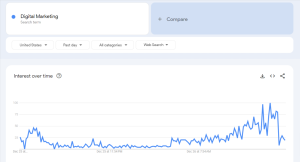
Google Trends provides two data samples:
- Real-time data: information from the last 7 days.
- Non-real-time data: a single data sample ranging from 2004 to 36 hours before your Google Trends search.
Certain types of search keywords are excluded from Google Trends. Here are a few examples:
- Search terms with very low volume: The tool only contains trending search terms. If a search phrase has a low volume, it is indicated by 0.
- Search terms that are duplicates: The program eliminates search phrases that are used repeatedly by the same user in a short period.
- Search terms with special characters: This tool refines queries including special characters such as apostrophes, semicolons, and so on.
Section 3: How To Do Keyword Research For SEO
As we navigate the intricate landscape of digital marketing, understanding how to conduct Keyword Research for SEO emerges as a critical component of optimizing online visibility. Let’s delve into the intricacies of tailoring your keyword strategy for Search Engine Optimization (SEO).
Keyword Research for SEO
I’ll walk you through a keyword research approach that will help you come up with a list of terms to target. That way, you’ll be able to develop and implement a solid keyword strategy that will help you be found for the search terms that are important to you.
- Understand User Intent: Start by comprehending the intent behind user searches. Align your keywords with what users are actively seeking.
- Prioritize Relevance: Relevance is key in SEO. Select keywords that closely match your content to enhance the likelihood of ranking higher in search results.
- Long-Tail Keywords Matter: While broad keywords are important, don’t overlook the power of long-tail keywords. They cater to specific queries and often have less competition.
- Utilize LSI Keywords: Latent Semantic Indexing (LSI) keywords are terms related to your main keywords. Integrating these adds depth and context to your content.
Local SEO Keyword Research
For businesses with a local presence, optimizing for local searches is paramount. Here’s how to tailor your keyword strategy for Local SEO:
- Incorporate Location-Specific Terms: Include city names, landmarks, and region-specific phrases to capture local search intent.
- Google My Business Optimization: Ensure your Google My Business listing is complete and accurate. This contributes significantly to local search visibility.
- Customer Reviews Matter: Encourage and manage customer reviews. Positive reviews not only enhance your reputation but also boost local SEO.
International SEO Keyword Research
Expanding your digital footprint globally necessitates a tailored approach to keyword research:
- Translate Keywords Appropriately: If targeting non-English-speaking markets, ensure your keywords are accurately translated to capture local nuances.
- Consider Cultural Differences: Understand cultural variations in search behavior and adjust your keyword strategy accordingly.
- Use Country-Specific Search Engines: Explore search engines specific to the target country for a more accurate representation of local search trends.
E-commerce Keyword Research
E-commerce platforms thrive on strategic keyword selection. Enhance your online store’s visibility with these strategies:
- Product-Centric Keywords: Tailor keywords to highlight your products. Include details such as brand, model, and specifications.
- Monitor Competitor Keywords: Keep an eye on your competitors’ keywords to identify trends and opportunities.
- Utilize Category-Specific Terms: Optimize for broader category terms to capture a wider audience.
YouTube Keyword Research
A YouTube keyword research tool can assist content providers in finding appropriate video titles. A YouTube keyword tool can assist you in researching the competition or finding new video ideas. YouTube’s search engine is comparable to that of Google, Yelp, and Yahoo. The website ranks search results based on keyword relevancy, popularity, and other factors. The most crucial factor is YouTube keywords. People who search on YouTube type particular words into the search field to find the videos they’re looking for.
These terms are keywords that the video maker can use to target certain types of queries. For example, someone may be seeking banana recipes. As an example, you may use keywords like “banana recipes” or “recipes involving bananas.” And, if you’re not sure what kind of keywords to employ, the keyword research tool can help. Do you require the Google Search API to track SERP results?
Blog Keyword Research
Blogs serve as the voice of your brand. Optimize your blog content for SEO success:
- Evergreen Content Keywords: Identify keywords that align with evergreen topics to ensure long-term relevance.
- Internal Linking Strategies: Use keywords for internal linking to improve the overall SEO structure of your blog.
- Stay Updated with Trends: Regularly update your keyword strategy to align with evolving industry trends.
PPC Keyword Research
Pay-per-click (PPC) campaigns demand precision in keyword selection. Maximize your ROI with these PPC-specific strategies:
- Focus on High-Converting Keywords: Prioritize keywords with a proven track record of converting leads.
- Negative Keywords Optimization: Continuously refine your list of negative keywords to filter out irrelevant traffic.
- Geo-Targeting Keywords: Tailor your keywords based on the geographic location of your target audience.
Amazon Keyword Research
For sellers on the e-commerce giant, Amazon, effective keyword research is a game-changer:
- Utilize Amazon’s Auto-Suggestions: Leverage Amazon’s auto-suggestions for valuable insights into popular search terms.
- Monitor Competitor Product Listings: Analyze competitor product listings to identify high-performing keywords.
- Strategic Placement in Product Titles: Place high-priority keywords strategically in your product titles for better visibility.
B2B Keyword Research
Business-to-business (B2B) interactions necessitate a unique keyword approach. Elevate your B2B SEO with these strategies:
- Industry-Specific Keywords: Tailor your keywords to align with the specific terminology of your industry.
- Focus on Solution-Oriented Terms: B2B audiences often search for solutions. Optimize for keywords that highlight the solutions your business provides.
- Thought Leadership Keywords: Position your business as a thought leader by incorporating keywords that reflect expertise and authority.
App Store Keyword Research
With a multitude of apps vying for attention, effective keyword research is crucial for App Store visibility:
- Relevance to App Functionality: Ensure your keywords align with the core functionality of your app.
- Regularly Update Keywords: Keep your app store keywords updated to adapt to changes in user behavior and industry trends.
- Analyze Competitor Keywords: Identify successful apps in your niche and analyze their keyword strategies for inspiration.
Section 4: Best Keyword Research Tools
In the ever-evolving landscape of digital marketing, mastering the art of keyword research is non-negotiable. As the gateway to SEO success, selecting the right tools becomes paramount. In this comprehensive guide, we unveil the best keyword research tools that promise to elevate your digital strategy and propel your website to the forefront of search engine results.
Keyword Research Tool
The foundation of any successful keyword strategy lies in a robust keyword research tool. These tools act as the compass, guiding you through the vast landscape of search queries and helping you unearth the gems that align with your content goals. Look for tools that offer a user-friendly interface, comprehensive keyword suggestions, and insightful metrics to streamline your research process.
Google Keyword Research Tool
Unlock the potential of your digital strategy by harnessing the robust features of the Google Keyword Research Tool. In the vast landscape of online content, understanding and leveraging the intricacies of search engine optimization (SEO) is paramount. Google’s tool emerges as a beacon in this realm, offering a comprehensive suite of insights that can elevate your online presence.
At the core of this tool’s prowess lies its ability to unveil critical information about search volume. By tapping into real-time data, you gain a profound understanding of how frequently specific keywords are being searched. This knowledge is invaluable in tailoring your content to align with the actual interests and queries of your target audience, ensuring that your efforts are not only visible but also highly relevant.
Moreover, the tool delves into the competitive landscape, providing a nuanced perspective on the intensity of competition for particular keywords. Armed with this information, you can strategically position your content to stand out amidst the digital noise. It’s not just about being seen; it’s about being seen by the right audience, and Google’s tool equips you with the insights to make informed decisions.
What sets this tool apart is its seamless integration with Google Ads. The transition from research to implementation is often a stumbling block for many digital marketers. However, with this tool, that barrier is dismantled. The synergy between keyword research and ad implementation ensures that your strategy is not just theoretical but translates into tangible, targeted advertisements. This integration streamlines the entire process, saving time and resources while maximizing the impact of your campaigns.
Crafting a cohesive strategy is not just about numbers and data; it’s about understanding your audience. The Google Keyword Research Tool empowers you to do just that by suggesting relevant keywords based on user behavior. This proactive approach ensures that your content aligns with the evolving preferences of your audience, staying ahead of trends and maintaining long-term relevance.
Google Search Console Keyword Research
Leverage the prowess of the Google Search Console for comprehensive keyword research, a fundamental aspect of refining your online presence. Google Search Console stands as a pivotal tool, offering invaluable insights into the performance of your website in Google’s search results. Within this console, a dedicated focus on keyword research unveils essential data that can profoundly impact your digital strategy.
One of the primary features of the Google Search Console is its ability to provide detailed information about the keywords that drive traffic to your website. By analyzing this data, you gain a clear understanding of which keywords are resonating with your audience and driving visibility. This insight is crucial for tailoring your content to align with the actual search terms your target audience employs, ensuring your website is not just visible but relevant.
Moreover, the console offers a glimpse into the performance of your website in terms of clicks, impressions, and average position for specific keywords. This nuanced data enables you to identify high-performing keywords, allowing you to optimize your content further for those terms. Conversely, it helps pinpoint underperforming keywords, providing an opportunity for strategic adjustments to enhance visibility.
The Google Search Console also aids in uncovering potential issues that might be affecting your website’s performance in search results. From crawl errors to mobile usability concerns, addressing these issues is integral to maintaining and improving your website’s overall SEO health. By resolving such issues, you ensure that your website is optimized for search engines, positively impacting its visibility and accessibility.
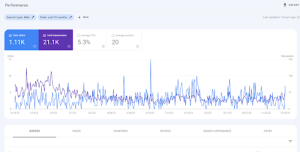
Furthermore, the console facilitates a deeper understanding of how users interact with your website. Metrics such as click-through rate (CTR) and user engagement metrics offer insights into the effectiveness of your content in attracting and retaining visitors. This understanding is pivotal for refining your content strategy and improving user experience, contributing to sustained online success.
SEMrush Keyword Research
SEMrush stands out as a powerful ally in the realm of SEMrush Keyword Research, providing a comprehensive suite of tools to elevate your digital strategy. With a focus on optimizing your online presence, SEMrush offers unparalleled insights into keyword analytics, competition analysis, and trend identification.
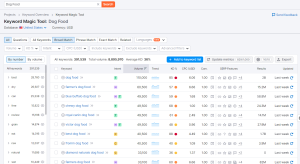
One of SEMrush’s key strengths lies in its ability to unveil valuable data on search volume, CPC (Cost Per Click), and keyword difficulty. Armed with this information, you can strategically choose keywords that align with your goals, ensuring maximum visibility within your target audience. The platform’s expansive keyword database allows you to explore niche-specific terms and uncover hidden opportunities that can set your content apart.
Additionally, SEMrush provides a detailed analysis of your competitors’ strategies, unveiling the keywords they are targeting and the organic and paid search landscape. This competitive intelligence enables you to fine-tune your approach, identify gaps in the market, and capitalize on areas where your competitors may be less prominent.
SEMrush’s real-time data updates and trend analysis further empower you to stay ahead of the curve. By identifying emerging keywords and adapting your strategy accordingly, you can maintain relevance in the ever-evolving digital landscape. The platform’s user-friendly interface and actionable insights make it a go-to tool for digital marketers seeking to refine their keyword strategy and boost their online visibility.
Ahrefs Keyword Research
Enter the world of comprehensive Ahrefs keyword research, a robust tool that empowers digital marketers to refine their online strategies. Ahrefs stands out for its ability to provide in-depth insights into keywords, backlinks, and competitor analysis.
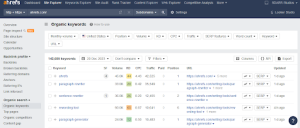
At the heart of Ahrefs’ capabilities is its extensive keyword database, offering a wealth of information on search volume, keyword difficulty, and related terms. This enables users to make informed decisions when selecting keywords, ensuring alignment with target audiences and industry trends. The platform’s meticulous analysis allows for the identification of high-performing keywords, providing a roadmap for optimizing content for maximum visibility.
A standout feature of Ahrefs is its emphasis on backlink analysis. Understanding the backlink landscape is crucial for SEO success, and Ahrefs excels in unveiling not only the quantity but also the quality of backlinks. This insight allows marketers to refine their link-building strategies, strengthen their website’s authority, and enhance overall search engine rankings.
Competitor analysis is another forte of Ahrefs. By dissecting the strategies of competitors, users can identify gaps and opportunities in the market. Ahrefs reveals the keywords competitors are targeting, their top-performing content, and their backlink strategies, enabling marketers to refine their approach and gain a competitive edge.
Ahrefs doesn’t just stop at static data; it provides dynamic insights with features like Content Explorer, which allows users to discover popular topics and trending content in their niche. This real-time analysis ensures that marketers stay ahead of industry trends and create content that resonates with their target audience.
Bing Keyword Research
Embark on effective keyword research with the Bing Keyword Research tool, a valuable resource for refining your digital strategy. While Google often takes center stage, Bing’s search engine plays a significant role, making it essential to explore and understand the keywords relevant to this platform.
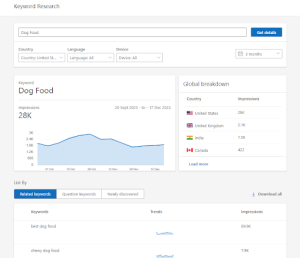
Bing Keyword Research offers insights into search volume, competition, and trending terms specific to Bing’s search engine. By tapping into this tool, digital marketers can uncover opportunities to optimize content for Bing’s audience, ensuring visibility and relevance in this search ecosystem.
Understanding search volume on Bing is crucial for tailoring your content to meet the preferences of users on this platform. Bing Keyword Research provides data on how frequently specific keywords are searched, enabling marketers to align their strategies with the search behavior of Bing’s audience.
Moreover, the tool sheds light on the competition for keywords on Bing, allowing users to assess the landscape and strategically position their content. By identifying keywords with lower competition, marketers can capitalize on opportunities to enhance visibility and attract a targeted audience.
Bing Keyword Research also aids in staying abreast of trending terms on the Bing search engine. This real-time information empowers marketers to adapt their content strategy, ensuring that it aligns with the current interests and queries of Bing users.
In essence, the Bing Keyword Research tool is a valuable asset for those seeking a holistic approach to keyword research. By delving into Bing’s specific insights, marketers can tailor their strategies, optimize content for this search engine, and broaden their online reach across diverse platforms.
Moz Keyword Research
Moz will take you on a journey of effective keyword research, a trusted platform that provides insightful tools to refine your digital marketing strategy. Moz’s Keyword Research tool stands out as a valuable resource, offering a comprehensive suite of features to empower marketers in understanding, selecting, and optimizing keywords for maximum impact.
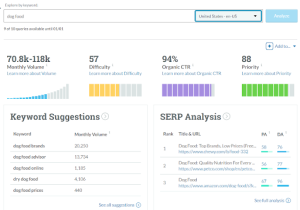
At the core of Moz’s capabilities is its ability to provide in-depth data on search volume, keyword difficulty, and organic click-through rates. This information equips marketers with the insights needed to make informed decisions when selecting keywords, ensuring alignment with their target audience and industry trends.
Moz’s Keyword Explorer tool goes beyond basic keyword metrics, offering valuable insights into the competitive landscape. Marketers can analyze the top-ranking pages for specific keywords, understand their domain authority, and identify opportunities to enhance their content strategy for improved visibility.
The platform’s prioritization of user intent is a notable feature, allowing marketers to focus on keywords that align with the searcher’s intent. This user-centric approach ensures that the selected keywords not only drive traffic but also resonate with the needs and interests of the audience.
Additionally, Moz provides a comprehensive view of the potential of specific keywords by estimating their potential organic click-through rates. This foresight aids marketers in forecasting the likely impact of their chosen keywords, enabling strategic planning and optimization efforts.
Moz’s commitment to providing actionable insights extends to its ability to track keyword performance over time. Marketers can monitor rankings, track fluctuations, and adjust their strategies based on real-time data, fostering agility in response to evolving search trends.
Fiverr Keyword Research Tool
Fiverr Keyword Research takes any keyword entered by the user and searches it on Fiverr, returning relevant or suggested keywords. This is a very useful tool for creating gigs. The keyword is the service you want to market to your client. Better keywords aid in gig ranking, allowing your client to focus on your gig.

Fiverr Keyword Research is a game-changing feature that empowers freelancers to amplify their gig performance. This tool allows users to input any keyword relevant to their service and swiftly generates a list of associated or recommended keywords. This functionality is particularly valuable for freelancers seeking to optimize their gig creation process on Fiverr.
The Role of Keywords in Gig Ranking
In the competitive landscape of online freelancing platforms, the right set of keywords can make all the difference. Your chosen keywords are essentially the bridge connecting your services with potential clients. When you utilize Fiverr Keyword Research effectively, you not only discover the most pertinent keywords related to your offerings but also elevate your gig’s ranking within Fiverr’s algorithm.
Keyword Researcher Pro
Keyword Researcher Pro is a powerful tool designed to facilitate comprehensive keyword research for digital marketers and SEO professionals. This software goes beyond basic keyword generation, offering features that empower users to discover niche-specific terms, assess competition, and refine their content strategy.
One of the standout features of Keyword Researcher Pro is its ability to generate long-tail keywords. Long-tail keywords are specific and often less competitive, making them valuable for targeting a more refined audience. The tool aids in the creation of extensive keyword lists, providing a robust foundation for optimizing content and improving search engine rankings.
The software also facilitates the organization and management of keywords. Users can categorize, filter, and prioritize keywords based on relevance, search volume, and competitiveness. This streamlined approach helps digital marketers make informed decisions about which keywords to target in their content and marketing campaigns.
Competitor analysis is another strength of Keyword Researcher Pro. The tool allows users to explore and analyze the keywords that competitors are targeting, providing valuable insights for refining their strategies. By understanding the keywords driving traffic to competitors’ websites, users can identify opportunities and gaps in their keyword targeting.
Additionally, the software often integrates with popular search engines and other keyword tools, enabling users to access real-time data and stay updated on evolving trends. This dynamic approach ensures that digital marketers can adapt their strategies to align with the current search landscape
SpyFu Keyword Research
SpyFu is a robust tool designed for competitive intelligence and keyword research, empowering digital marketers to refine their strategies by gaining insights into competitors’ online activities. With a focus on providing comprehensive data, SpyFu aids in uncovering valuable information related to keywords, ad campaigns, and organic search performance.
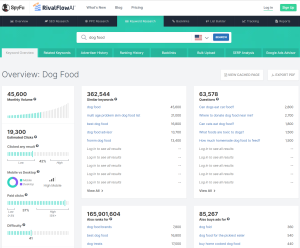
One of the key features of SpyFu is its ability to reveal the keywords that competitors are targeting in both paid and organic searches. This insight allows users to understand the landscape of their industry, identify high-performing keywords, and adjust their strategies accordingly. By analyzing competitors’ keyword choices, digital marketers can uncover opportunities for optimization and strategic targeting.
SpyFu also provides historical data on keyword performance, allowing users to track changes over time. This historical perspective is valuable for identifying trends, understanding the impact of specific events or campaigns, and making informed decisions based on long-term performance metrics.
The tool extends its capabilities to PPC advertising by offering insights into competitors’ ad copy, ad spending, and the keywords they are bidding on. This information is crucial for optimizing your own PPC campaigns, ensuring efficient budget allocation, and crafting compelling ad copy that stands out in the competitive landscape.
Furthermore, SpyFu facilitates competitor analysis by providing metrics on a website’s overall organic search performance, backlink profile, and ranking history. This holistic view enables digital marketers to assess the overall strengths and weaknesses of competitors, informing strategic decisions for their campaigns.
Section 5: How to Analyze Keywords
In the intricate realm of SEO, understanding how to analyze keywords is the linchpin of success. Unravelling the intricacies of user intent, search volume, and competition is the key to crafting content that not only resonates with your audience but also ascends the ranks of search engine results. In this comprehensive guide, we delve into the essential aspects of keyword analysis, providing you with the insights needed to optimize your content strategy.
Keyword Research Search Volume
Understanding the search volume of a keyword is fundamental to gauging its potential impact on your website’s visibility. Search volume refers to the number of times a particular keyword is searched within a specific timeframe. Balancing high search volume with relevance is the sweet spot for targeting keywords that attract substantial traffic.
When analyzing search volume, consider the nature of your content. High search volume keywords may bring more traffic, but they also often come with higher competition. Conversely, low search volume keywords may be easier to rank for but might not attract significant traffic. Striking a balance ensures your content reaches the right audience without getting lost in the sea of search results.
Keyword Search Intent
User intent lies at the heart of effective keyword analysis. It’s not just about matching keywords; it’s about understanding what users are looking for when they type those keywords into a search engine. Keyword search intent falls into several categories:
- Informational Intent: Users seek information. Craft content that educates and answers queries.
- Navigational Intent: Users want to navigate to a specific website. Optimize for brand-related keywords.
- Transactional Intent: Users are ready to make a purchase. Create content that facilitates conversions.
- Commercial Investigation Intent: Users are researching before making a decision. Provide in-depth, comparative content.
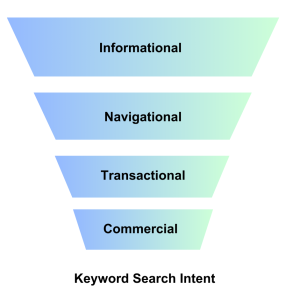
Understanding and aligning your content with user intent ensures that your website not only attracts traffic but also fulfils the needs of your audience, leading to higher engagement and conversions.
Keyword Difficulty
Navigating the competitive landscape requires a keen understanding of keyword difficulty. This metric assesses how challenging it is to rank for a specific keyword. While high-difficulty keywords may offer substantial traffic potential, they also pose a greater challenge to rank for. Conversely, low-difficulty keywords may be easier to rank for but might not bring significant traffic.
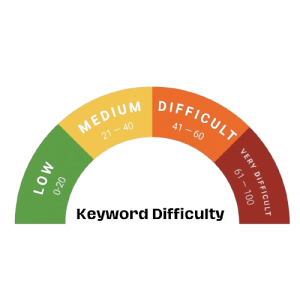
When analyzing keyword difficulty, strike a balance that aligns with your website’s authority and the competitiveness of your niche. Consider a mix of high, medium, and low-difficulty keywords to create a diversified and effective content strategy.
Long Tail Keyword Research
The era of long-tail keywords has ushered in a new dimension of specificity. Long-tail keywords are longer, more detailed phrases that cater to niche audiences. long-tail keywords typically contain 2-3 words and are concerned with narrow or niche themes as opposed to broad terms. Long-tail keywords include phrases like “on-page SEO WordPress plugin” or “digital marketing strategy example.” Although search numbers are often modest, competition is also low, and conversion rates are high. Producing content that especially targets long-tail keywords for small websites will thus be very efficient and profitable. Furthermore, long-tail keywords will be easier to rank in Google SERPs and will quickly improve your website traffic. Analyzing and incorporating long-tail keywords into your strategy offers several advantages:

- Reduced Competition: Long-tail keywords often have lower competition, making it easier to rank for.
- Higher Conversion Rates: Users searching with long-tail keywords often have clearer intent, leading to higher conversion rates.
- Enhanced Relevance: Long-tail keywords allow you to craft content that precisely matches user queries.
Incorporating long-tail keywords into your strategy adds depth and specificity to your content, catering to the diverse needs of your audience.
Section 6: Competitor Analysis
In the fast-paced world of digital marketing, understanding your competitors is not just an option; it’s a strategic imperative. Competitor analysis in the realm of Search Engine Optimization (SEO) is akin to navigating uncharted waters armed with a treasure map. In this comprehensive guide, we unravel the intricacies of competitor analysis, providing you with the insights needed to propel your website to the forefront of search engine results.
Competitor Keyword Research
At the heart of competitor analysis lies the treasure trove of competitor keyword research. Understanding the keywords that drive your competitors’ success is like holding the key to their digital kingdom. Here’s how you can unravel their strategy
- Identify Top Competitors: Begin by identifying your main competitors in the digital landscape. These are the players who consistently rank high for keywords relevant to your niche.
- Analyze Their Content: Dive into the content of your competitors. What keywords are they targeting? What topics are they covering? Analyzing their content strategy provides valuable insights into the keywords that resonate with your shared audience.
- Assess Their Backlink Profile: Backlinks are the backbone of SEO success. Analyze your competitors’ backlink profiles to understand where their authoritative links come from. This insight can guide your own link-building strategy.
- Utilize Competitor Analysis Tools: Leverage specialized tools like SEMrush, Ahrefs, or SpyFu for in-depth competitor keyword research. These tools provide comprehensive reports on your competitors’ keywords, ad strategies, and organic search performance.
Keyword Gap Research
Keyword Gap Research is a pivotal aspect of digital marketing strategy, providing insights that can elevate your online presence. This method involves identifying the keywords that competitors are targeting but are not currently a part of your strategy. By analyzing this “gap,” marketers can uncover untapped opportunities to expand their reach and enhance their keyword targeting.
Keyword research can be done in a variety of ways. A keyword gap study, also known as a content gap or keyword competitor analysis, is required. There are no ties when it comes to SEO. Only one firm can be number one, and you want it to be your site if you want the most organic traffic. We know that the top Google result receives more than 31% of clicks, with minor fluctuation based on industry, term, and device. However, regardless of industry, the amount of clicks (and thus traffic) to your website reduces continuously as you move from one to two and so on. If your competitors outrank you, they will receive more organic traffic, leads, and sales. You may, however, defeat them with a solid SEO plan, which a keyword gap analysis can assist you in developing.
Section 7: Future Trends in Keyword Research
In the ever-evolving landscape of digital marketing, staying ahead requires anticipating future trends.
AI Keyword Research
Artificial Intelligence (AI) is not just a buzzword; it’s a transformative force in the world of digital marketing. AI-driven keyword research is set to revolutionize how we understand, analyze, and implement keywords. Here’s how AI is poised to reshape the future:
- Predictive Analysis: AI algorithms can analyze vast amounts of data to predict future search trends. By understanding user behavior patterns, AI can forecast upcoming keywords, allowing marketers to stay ahead of the competition.
- Natural Language Processing (NLP): As search engines become more adept at understanding natural language, keyword research will shift towards long-tail phrases and conversational queries. NLP-powered AI tools can decipher user intent with greater accuracy, shaping content strategies to align seamlessly with user expectations.
- Personalization: AI enables hyper-personalization in search results. Future keyword research will involve understanding individual user preferences, tailoring content to specific audiences, and optimizing for personalized search experiences.
- Automation of Routine Tasks: AI can automate routine keyword research tasks, allowing marketers to focus on strategy and creativity. From generating keyword suggestions to analyzing competition, AI-driven tools streamline processes, saving time and enhancing efficiency.
- Personalized Intent: As AI and machine learning advance, the ability to personalize user intent analysis will become more refined. Marketers will need to tailor content to individual preferences, predicting and fulfilling user needs with precision.
- Cross-Channel Intent Integration: User intent goes beyond a single channel. Future keyword research will involve integrating insights from various channels, including social media, to create a holistic understanding of user intent.
- Real-Time Intent Adjustments: The digital landscape is dynamic, and so is user intent. Future keyword research strategies will involve real-time adjustments to align with shifting user behaviors, ensuring continued relevance and engagement.
I am 10-year experienced digital marketing expert with experience of managing Local SEO, PPC, and Social media accounts.

